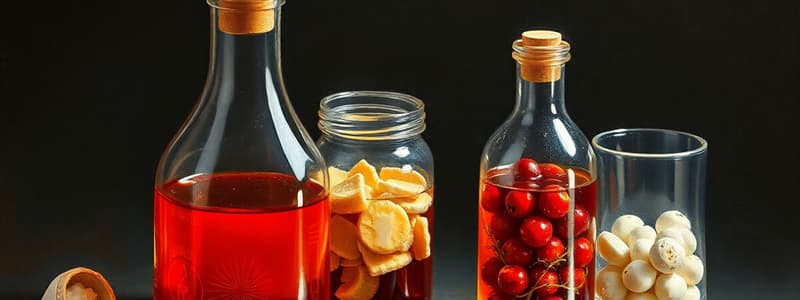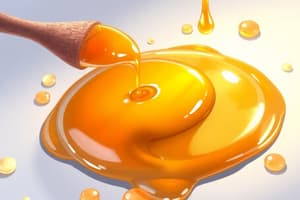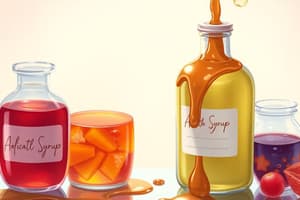Podcast
Questions and Answers
What are medicated syrups and why are they important in therapy?
What are medicated syrups and why are they important in therapy?
Medicated syrups are syrup formulations that contain therapeutic agents for treatment, providing a pleasant-tasting vehicle for administering otherwise disagreeable drugs, especially to children.
Describe the role of nonmedicated syrups in the preparation of medicated syrups.
Describe the role of nonmedicated syrups in the preparation of medicated syrups.
Nonmedicated syrups serve as flavored vehicles that can enhance the taste of the medicated syrups, making them more palatable for administration.
Explain the significance of sucrose in the formulation of syrups.
Explain the significance of sucrose in the formulation of syrups.
Sucrose acts as the primary sugar component, providing sweetness and viscosity essential for the stability and palatability of syrups.
What factors must be considered when selecting a liquid dosage form for drug compounding?
What factors must be considered when selecting a liquid dosage form for drug compounding?
Why might a pharmacist opt to prepare an oral liquid dosage form instead of solid dosage forms?
Why might a pharmacist opt to prepare an oral liquid dosage form instead of solid dosage forms?
What ingredients are typically involved in the preparation of medicated syrups?
What ingredients are typically involved in the preparation of medicated syrups?
How do flavored syrups aid in administering bitter-tasting drugs to children?
How do flavored syrups aid in administering bitter-tasting drugs to children?
What types of syrups are mentioned in the content, and what are their respective roles?
What types of syrups are mentioned in the content, and what are their respective roles?
What is the specific gravity of Syrup, NF?
What is the specific gravity of Syrup, NF?
How much sucrose is dissolved to prepare 100 mL of Syrup, NF?
How much sucrose is dissolved to prepare 100 mL of Syrup, NF?
What corresponds to the weight difference between the total syrup weight and the sucrose weight in Syrup, NF?
What corresponds to the weight difference between the total syrup weight and the sucrose weight in Syrup, NF?
What is the maximum solubility of sucrose in water as mentioned?
What is the maximum solubility of sucrose in water as mentioned?
Why are preservatives added to some syrups but not to Syrup, NF?
Why are preservatives added to some syrups but not to Syrup, NF?
What is the slight excess of water used in the preparation of Syrup, NF?
What is the slight excess of water used in the preparation of Syrup, NF?
What can happen to sucrose when the syrup is stored in cooler temperatures?
What can happen to sucrose when the syrup is stored in cooler temperatures?
What factors dictate the method of syrup preparation?
What factors dictate the method of syrup preparation?
How much water in mL is actually required to dissolve 85 g of sucrose?
How much water in mL is actually required to dissolve 85 g of sucrose?
What potential issue arises from a completely saturated syrup when stored at low temperatures?
What potential issue arises from a completely saturated syrup when stored at low temperatures?
What is the primary role of sugar in syrups?
What is the primary role of sugar in syrups?
Name two alternative substances that can replace sucrose in syrups.
Name two alternative substances that can replace sucrose in syrups.
How do cellulose derivatives like methylcellulose affect syrup formulations?
How do cellulose derivatives like methylcellulose affect syrup formulations?
What is the significance of maintaining a high sucrose concentration in syrups?
What is the significance of maintaining a high sucrose concentration in syrups?
What protective effect do thick syrups have when used as medicinal preparations?
What protective effect do thick syrups have when used as medicinal preparations?
Why are dilute sucrose solutions more prone to microbial growth compared to concentrated solutions?
Why are dilute sucrose solutions more prone to microbial growth compared to concentrated solutions?
What types of agents might commercial syrups include beyond the basic components?
What types of agents might commercial syrups include beyond the basic components?
What is the role of antimicrobial preservatives in syrups?
What is the role of antimicrobial preservatives in syrups?
Why might a thick, sweet syrup be beneficial for antitussive medications?
Why might a thick, sweet syrup be beneficial for antitussive medications?
What are colorants used for in syrup formulations?
What are colorants used for in syrup formulations?
What is the primary benefit of using boiled purified water in syrup preparation?
What is the primary benefit of using boiled purified water in syrup preparation?
Why might heat not be used in the preparation of certain syrups?
Why might heat not be used in the preparation of certain syrups?
What is the purpose of storing syrups in tight containers?
What is the purpose of storing syrups in tight containers?
What process is recommended for incorporating solid agents into syrups?
What process is recommended for incorporating solid agents into syrups?
What are the two main procedures involved in preparing ipecac syrup?
What are the two main procedures involved in preparing ipecac syrup?
How is a tincture or fluidextract processed before adding sucrose in syrup preparation?
How is a tincture or fluidextract processed before adding sucrose in syrup preparation?
What is the primary medicinal use of syrup of ipecac and what is its usual dose in children?
What is the primary medicinal use of syrup of ipecac and what is its usual dose in children?
What is the role of preservatives in syrup formulation?
What is the role of preservatives in syrup formulation?
What are the potential risks associated with the misuse of syrup of ipecac?
What are the potential risks associated with the misuse of syrup of ipecac?
What is the significance of allowing the mixture of sucrose and water to stand during preparation without heating?
What is the significance of allowing the mixture of sucrose and water to stand during preparation without heating?
Identify the active alkaloid found in ipecac and describe its significance.
Identify the active alkaloid found in ipecac and describe its significance.
In what scenarios is simple syrup preferred over sucrose as a sweetening agent?
In what scenarios is simple syrup preferred over sucrose as a sweetening agent?
Name two other types of syrup preparations mentioned and their respective uses.
Name two other types of syrup preparations mentioned and their respective uses.
What does the term 'percolation' refer to in syrup preparation?
What does the term 'percolation' refer to in syrup preparation?
What are the effects of syrup's viscous nature on solid substances added to it?
What are the effects of syrup's viscous nature on solid substances added to it?
Study Notes
Syrups
- Concentrated aqueous solutions of sugar or sugar substitute, with or without flavoring agents and medicinal substances.
- Non-medicated syrups are flavored vehicles used to mask unpleasant tastes.
- Common non-medicated syrups include cherry, cocoa, orange, and raspberry syrup.
- Medicated syrups contain therapeutic agents for treatment.
- Syrups are effective for medication delivery, especially for children and elderly people who struggle swallowing solid dosage forms.
- Components include sugar (usually sucrose), antimicrobial preservatives, flavorants, and colorants.
- Commercially prepared syrups may also include special solvents, solubilizing agents, thickeners, or stabilizers.
Sucrose- and Non-Sucrose-Based Syrups
- Sucrose is the most frequently used sugar in syrups.
- In special instances, sucrose may be replaced by sorbitol, glycerin, or propylene glycol.
- Non-glycogenetic substances like methylcellulose and hydroxy ethylcellulose are used for diabetic patients.
- Viscosity of cellulose derivatives is similar to sucrose syrups, masking the taste of medications.
- The thick, sweet syrup in antitussive syrups soothes irritated throat tissues.
Stability and Preparation
- High sucrose concentration (60-80%) contributes to syrup stability.
- Concentrated sugar solutions are resistant to microbial growth due to limited water availability for microorganisms.
- Syrups are prepared by various methods: solution by agitation without heat, addition of sucrose to a medicated or flavored liquid, percolation.
- Boiled purified water enhances syrup permanency.
- Preservation agents are added to enhance shelf life.
- Storage in a tight container is essential for all syrups.
Syrup Preparation Methods
- Solution by Agitation Without the Aid of Heat: Dissolving sucrose and other ingredients in purified water through agitation, avoiding heat-induced sucrose inversion.
- Addition of Sucrose to a Medicated Liquid or Flavored Liquid: Used when a medicated liquid, such as a tincture or fluidextract, serves as the source of medication in syrup preparation.
- Percolation: Involves extracting the medicinal component from its source and adding sucrose or syrup.
- Example of Percolation: Ipecac Syrup, prepared from an extractive of ipecac (Cephaelis ipecacuanha) through percolation.
- Ipecac Syrup: Categorized as an emetic and used for managing poisoning in children.
- Important Note: Misuse of ipecac syrup (e.g., for weight loss purposes) can cause serious health problems.
- Commonly Available Syrup Preparations: Bromhexine (mucolytic agent), Salbutamol (bronchodilator), Samilin, Tussilet (cough preparations).
Studying That Suits You
Use AI to generate personalized quizzes and flashcards to suit your learning preferences.
Related Documents
Description
This quiz explores the types of syrups, including medicated and non-medicated varieties. Learn about their ingredients, usage, and significance, especially in medication delivery for children and the elderly. Additionally, discover the alternatives to sucrose and their applications in syrups.




